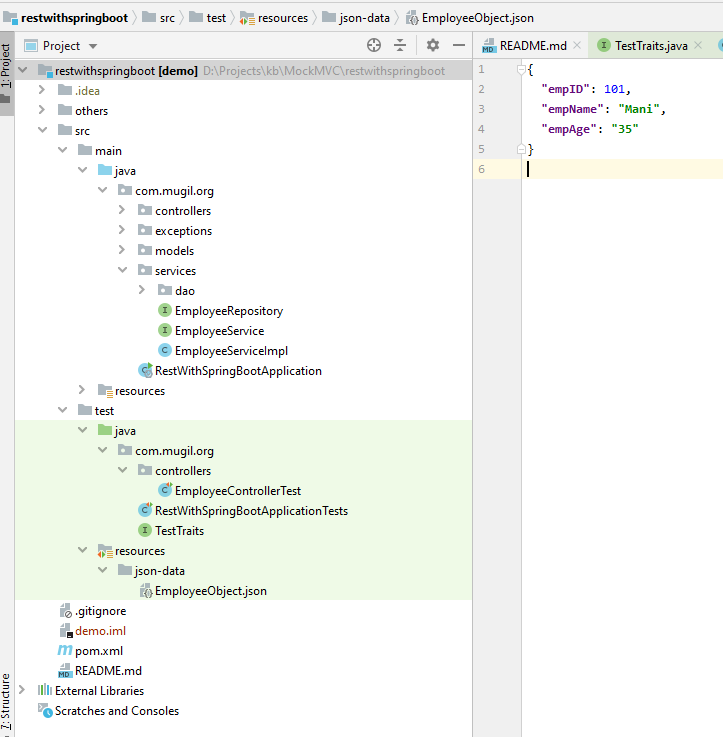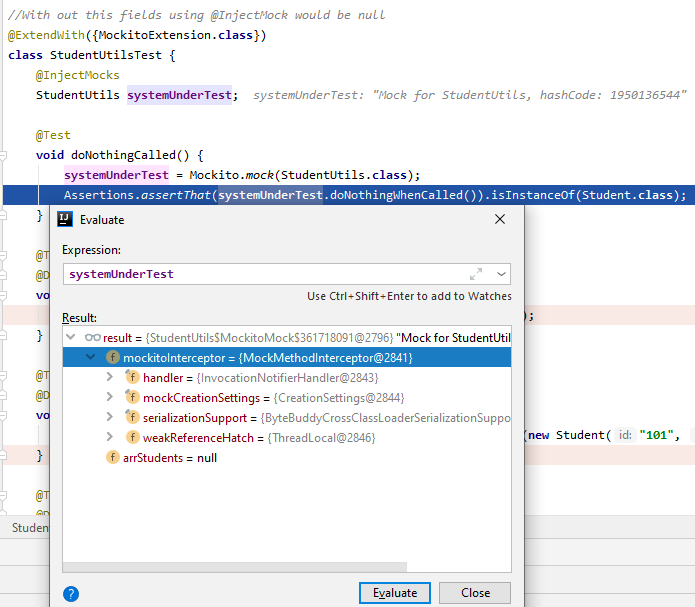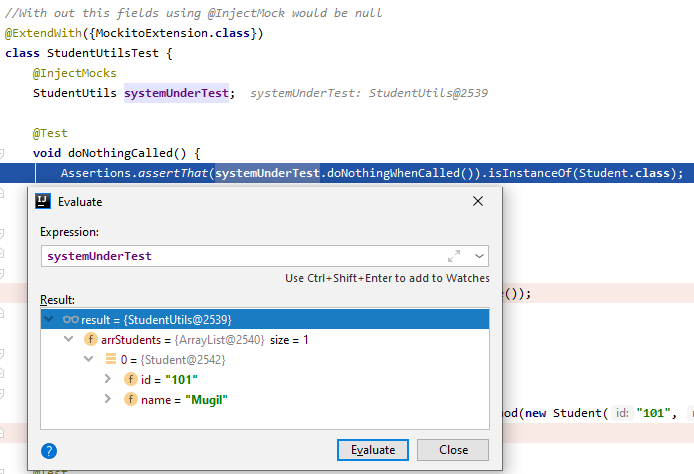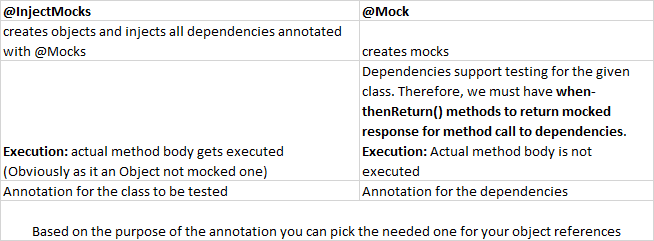POST
@Test
void addEmployeeDetails() throws Exception {
Employee objEmployee = (Employee) TestTraits.getObjfromJson("json-data/EmployeeObject.json");
String jsonRequestString = mapper.writeValueAsString(objEmployee);
when(employeeServiceImpl.saveEmployee(any())).thenReturn("101");
ResultActions objResultActions = this.mockMvc.perform(post("/empmgmt/employees")
.contentType(MediaType.APPLICATION_JSON)
.content(jsonRequestString))
.andDo(print())
.andExpect(jsonPath("$.empID", is(Matchers.notNullValue())))
.andExpect(jsonPath("$.empID", is(101)))
.andExpect(jsonPath("$.empName", is("Mani")))
.andExpect(status().isCreated());
}
GET
@Test
void getEmployeeDetails() throws Exception {
ClassLoader loader = Test.class.getClassLoader();
Employee objEmployee = (Employee) TestTraits.getObjfromJson("json-data/EmployeeObject.json");
Optional<Employee> objEmp = Optional.ofNullable(objEmployee);
when(employeeServiceImpl.findEmployee(EMP_ID)).thenReturn(objEmp);
ResultActions objResultActions = this.mockMvc.perform(get("/empmgmt/employees/{empID}",EMP_ID))
.andDo(print())
.andExpect(jsonPath("$.empID", is(101)))
.andExpect(jsonPath("$.empName", is("Mani")))
.andExpect(jsonPath("$._links.all-employees.href", is("http://localhost/empmgmt/employees")))
.andExpect(status().isOk());
}
DELETE
@Test
void deleteEmployeeDetails() throws Exception {
when(employeeServiceImpl.deleteEmployee(Long.valueOf(EMP_ID))).thenReturn(true);
this.mockMvc.perform(delete("/empmgmt/employees/{empID}",EMP_ID))
.andDo(print())
.andExpect(content().string(containsString("Employee Deleted Successfully")))
.andExpect(status().isOk());
}
EmployeeControllerTest.java
package com.mugil.org.controllers;
import com.fasterxml.jackson.databind.ObjectMapper;
import com.mugil.org.TestTraits;
import com.mugil.org.models.Employee;
import com.mugil.org.services.EmployeeServiceImpl;
import org.hamcrest.Matchers;
import org.junit.jupiter.api.Test;
import org.junit.jupiter.api.extension.ExtendWith;
import org.springframework.beans.factory.annotation.Autowired;
import org.springframework.boot.test.autoconfigure.web.servlet.WebMvcTest;
import org.springframework.boot.test.mock.mockito.MockBean;
import org.springframework.http.MediaType;
import org.springframework.test.context.junit.jupiter.SpringExtension;
import org.springframework.test.web.servlet.MockMvc;
import org.springframework.test.web.servlet.ResultActions;
import java.util.ArrayList;
import java.util.List;
import java.util.Optional;
import static org.hamcrest.Matchers.containsString;
import static org.hamcrest.Matchers.is;
import static org.mockito.ArgumentMatchers.any;
import static org.mockito.Mockito.when;
import static org.springframework.test.web.servlet.request.MockMvcRequestBuilders.*;
import static org.springframework.test.web.servlet.result.MockMvcResultHandlers.print;
import static org.springframework.test.web.servlet.result.MockMvcResultMatchers.*;
@ExtendWith(SpringExtension.class)
@WebMvcTest(EmployeeController.class)
class EmployeeControllerTest {
@MockBean
EmployeeServiceImpl employeeServiceImpl;
ObjectMapper mapper = new ObjectMapper();
@Autowired
private MockMvc mockMvc;
private static final String EMP_ID = "101";
@Test
void getEmployeeDetails() throws Exception {
ClassLoader loader = Test.class.getClassLoader();
Employee objEmployee = (Employee) TestTraits.getObjfromJson("json-data/EmployeeObject.json");
Optional<Employee> objEmp = Optional.ofNullable(objEmployee);
when(employeeServiceImpl.findEmployee(EMP_ID)).thenReturn(objEmp);
ResultActions objResultActions = this.mockMvc.perform(get("/empmgmt/employees/{empID}",EMP_ID))
.andDo(print())
.andExpect(jsonPath("$.empID", is(101)))
.andExpect(jsonPath("$.empName", is("Mani")))
.andExpect(jsonPath("$._links.all-employees.href", is("http://localhost/empmgmt/employees")))
.andExpect(status().isOk());
}
@Test
void deleteEmployeeDetails() throws Exception {
when(employeeServiceImpl.deleteEmployee(Long.valueOf(EMP_ID))).thenReturn(true);
this.mockMvc.perform(delete("/empmgmt/employees/{empID}",EMP_ID))
.andDo(print())
.andExpect(content().string(containsString("Employee Deleted Successfully")))
.andExpect(status().isOk());
}
@Test
void getAllEmployeeDetails() throws Exception {
List<Employee> arrEmployees = new ArrayList<>();
arrEmployees.add(getEmployee());
when(employeeServiceImpl.findAllEmployee()).thenReturn(arrEmployees);
ResultActions objResultActions = this.mockMvc.perform(get("/empmgmt/employees")
.contentType(MediaType.APPLICATION_JSON))
.andDo(print())
.andExpect(jsonPath("$[0].empID", is(Matchers.notNullValue())))
.andExpect(jsonPath("$[0].empID", is(101)))
.andExpect(jsonPath("$[0].empName", is("Shivaji")))
.andExpect(status().is2xxSuccessful());
}
@Test
void addEmployeeDetails() throws Exception {
Employee objEmployee = (Employee) TestTraits.getObjfromJson("json-data/EmployeeObject.json");
String jsonRequestString = mapper.writeValueAsString(objEmployee);
when(employeeServiceImpl.saveEmployee(any())).thenReturn("101");
ResultActions objResultActions = this.mockMvc.perform(post("/empmgmt/employees")
.contentType(MediaType.APPLICATION_JSON)
.content(jsonRequestString))
.andDo(print())
.andExpect(jsonPath("$.empID", is(Matchers.notNullValue())))
.andExpect(jsonPath("$.empID", is(101)))
.andExpect(jsonPath("$.empName", is("Mani")))
.andExpect(status().isCreated());
}
private Employee getEmployee(){
Employee objEmployee = new Employee();
objEmployee.setEmpID(Long.valueOf(101));
objEmployee.setEmpAge("35");
objEmployee.setEmpName("Shivaji");
return objEmployee;
}
}




